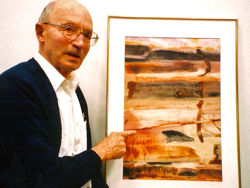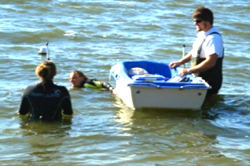Nichols creates student travel fellowship at VIMS
Professor emeritus Maynard Nichols of the Virginia Institute of Marine Science has given a gift of $2,000 to support a fellowship for graduate students in the School of Marine Science at VIMS, and plans to continue the award annually. The fellowship will help selected students travel to conferences or workshops to share their research results with colleagues.
The initial recipient of the Nichols Student Travel Fellowship is Master’s student Stephanie Salisbury, who used her share of the travel fund to attend the annual meeting of the American Society of Limnology and Oceanography (ASLO) in San Juan, Puerto Rico in February.
Nichols says the fellowship is “an important way to support VIMS’ education program and its students—giving them experience in presenting and testing new results.”
Salisbury agrees, saying, “I was excited to attend this meeting because it was my first international science conference, and my first conference as a graduate student. Overall, I found the meeting incredibly inspiring and tremendously beneficial to my research as well as my scientific soul.”
Maynard and his wife Mrs. Jane Nichols established the fellowship through the VIMS Foundation, a nonprofit 501 (c) (3) organization that supports VIMS' mission of education and research. Nichols says he ultimately plans to endow the fellowship through his estate plans.
VIMS Dean and Director John Wells thanked the Nichols for their gift during a recent visit to the VIMS campus in Gloucester Point. “We greatly appreciate the Nichols’ very generous contribution,” said Wells. “It provides much-needed student support and honors Maynard’s past contributions in sedimentology, oceanography, and marine art.”

Nichols retired from VIMS in 1992 following a 32-year career studying the transport of sediments and pollutants in estuaries. His work had important and long-lasting implications for sand mining, flood-zone mapping, Kepone clean-up, and channel dredging and disposal in Chesapeake Bay. Since his retirement, he has been active in the local art scene, exhibiting his Bayscape watercolors throughout the Tidewater region.
Nichols says his decision to create a travel fellowship reflects the value he gained from his own experiences at scientific meetings. Active in international programs, Nichols attended and organized meetings on sediment pollution (Netherlands), coastal engineering and geology (University of Bordeaux), pollutant transfer (State University of New York), sand-mining (U.S. Virgin Islands), coastal-zone contaminants (Nantes, France), manned undersea research (NOAA, Washington, D.C.), and numerous other science topics.
Attendance at scientific meetings, says Nichols, “fills an important niche in a student’s research tenure at VIMS, giving them an opportunity to communicate new research findings to a national or international scientific audience.”

During the ASLO meeting in Puerto Rico, Salisbury discussed her research with colleagues from around the world. Salisbury is studying carbon cycling within shallow-water estuaries, specifically the role played by single-celled algae and their release of “extracellular polymeric substances.” These "EPS" compounds—mixtures of carbohydrates, proteins, and DNA—are an important part of marine food webs. Her academic advisor is professor Elizabeth Canuel.
“Attending the ASLO meeting allowed me to communicate my findings and experiences with a variety of other scientists,” she says. “I had lengthy conversations with a biogeochemist from England about some of the new technology he is implementing in his studies and how it might complement my work.”
She also made contact with a French graduate student pursuing similar studies in an estuary in France. “We chatted at one of the poster sessions, and I found out that he also intends to look into the EPS produced by benthic microalgae, so we exchanged contact information and will hopefully be able to help each other in the future—even though our study systems and objectives are very different.”


